

Call for papers: Making Transparency Possible – Interdisciplinary Dialogues, Research Conference, at Oslo and Akershus, University College of Applied Sciences (HiOA), Norway, the 15th and 16th of February, 2018
The research project “Making Transparency Possible – Interdisciplinary dialogues” invites paper proposals from all relevant disciplines on cross border journalism on global illicit financial flows and tax havens.
A maximum of 15 papers will be selected to participate. The best papers will be chosen for publication after the conference. Please send abstracts of app. 500 words to: conference@pwyp.no Deadline for submitting abstract: January 20, 2018. Selected participants will be notified before February 1.
No conference fee. Participants are expected to cover travel and stay during the conference.
In April 2017, the Panama Papers investigation was awarded the Pulitzer Prize for Explanatory Reporting for “using a collaboration of more than 300 reporters on six continents to expose the hidden infrastructure and global scale of offshore tax havens”. The award is only the latest in a series of accolades for the globe-spanning reporting effort by the International Consortium of Investigative Journalists (ICIJ) that includes the Miami Herald, Süddeutsche Zeitung and a number other media partners. ICIJ is itself an example of an innovative form of journalism, representing an unprecedented level of collaboration with more than 190 investigative journalists in more than 65 countries teaming up to deliver in-depth investigative stories. Digital technology has facilitated such innovative global collaborative networks of mutual aid across countries and continents, seemingly in contrast to the dominating media market paradigm stipulating ever-increasing competition between journalists and media houses.
Publish What You Pay Norway, a network of 20 Norwegian civil society organizations, together with the Department of journalism and media studies at Oslo and Akershus University College (HiOA), has for several years organized seminars on how to make transparency on financial flows possible. Along with journalists, high-level delegations from Norwegian tax authorities, criminal investigators and Norwegian development agency have participated, and so have professors of economy, law, journalism and development studies. Moreover, editors and investigative journalists have been represented through bodies such as the Association of Norwegian Editors and SKUP (a foundation that since 1990 has been dedicated to promoting investigative journalism in Norway).
Following from discussions at these events, we have identified a number of challenges related to cross border investigative journalism as begging further research:
– How to understand and theorize the use of digital communication to build cross border networks of mutual aid between investigative journalists.
– The challenge of making digital communication safe, in order to protect sources (whistle-blowers) and the involved journalists themselves
– How to interpret and understand complex information on finance and financial transaction, including the workings of intricate global networks of businesses and webs of ownerships, including those registered in tax havens
– Understanding national and international law regulating financial flows. Understanding the political-regulative, economic and financial drivers underlying illicit financial flows
The organisers wish to facilitate a dialogue between researchers educated and experienced in disciplines such as (but not limited to) law, economy and journalism studies on these issues. We welcome relevant paper proposals dealing with digital investigative journalism, cross border cooperation, tax havens, illicit financial flows etc. from all relevant disciplines.
Confirmed speakers:
Lina Chawaf (Executive Manager, Rozana, part of the winning global consortium of journalists that won The Pulizer Prize 2017), Syria.
Craig McKune (amaBhungane Centre for Investigative Journalism), South Africa. Kristine Agalaryan, investigative journalist for www.hetq.am , Armenia. Jóhannes Kr. Kristjánsson, owner of Reykjavik Media and co-founder of the Icelandic Center for Investigative Journalism.
Professor Beate Sjåfjell (University of Oslo). Sjåfjell’s main field is company law and corporate governance, with much of her research concentrating on the regulation of business in the broader context of sustainability. Sjåfjell is founder and head of the Oslo Faculty’s Research “Group Companies, Markets and Sustainability”, which is now in its second period (2017-2021), as well as several international networks and projects.
Professor Tina Søreide (The Norwegian School of Economics). Søreide’s research is focused on corruption, governance, markets and development, currently with an emphasis on law enforcement. Søreide is member of the High Level Advisory Group on Anticorruption and Integrity (HLAG) to the Secretary General of the OECD.

Professor Kalle Moene (University of Oslo). Moene is head of ESOP – Centre for the Study of Equality, Social Organization and Performance (University of Oslo), which is funded by The Research Council of Norway as part of the Centres of Excellence (SFF) scheme. Moene’s main research areas are institutions compared, economic development, unions and welfare states.
Doctoral Research Fellow Linn Anker-Sørensen (University of Oslo) is currently researching financial engineering situated in the intersection between corporate law, financial market law and contract law, and furthermore in the topical intersection between financial disclosure, access to information, corporate accountability and risk implications.
Convenor: Professor Roy Krøvel, Department of journalism and media studies, Oslo and Akershus University College of Applied Sciences.
